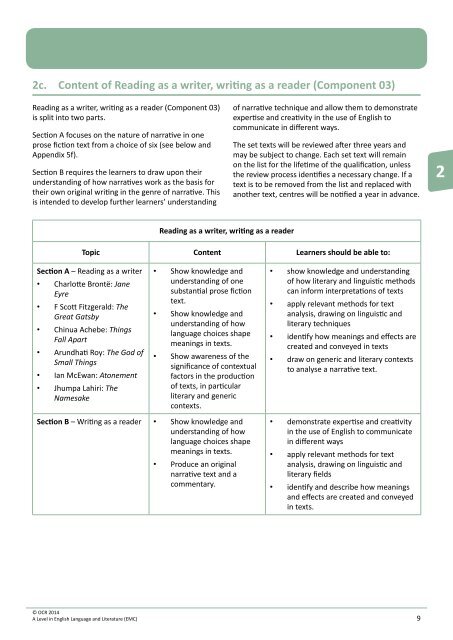171202-specification-accredited-a-level-gce-english-language-and-literature-h474
171202-specification-accredited-a-level-gce-english-language-and-literature-h474
171202-specification-accredited-a-level-gce-english-language-and-literature-h474
Create successful ePaper yourself
Turn your PDF publications into a flip-book with our unique Google optimized e-Paper software.
2c. Content of Reading as a writer, writing as a reader (Component 03)Reading as a writer, writing as a reader (Component 03)is split into two parts.Section A focuses on the nature of narrative in oneprose fiction text from a choice of six (see below <strong>and</strong>Appendix 5f).Section B requires the learners to draw upon theirunderst<strong>and</strong>ing of how narratives work as the basis fortheir own original writing in the genre of narrative. Thisis intended to develop further learners’ underst<strong>and</strong>ingof narrative technique <strong>and</strong> allow them to demonstrateexpertise <strong>and</strong> creativity in the use of English tocommunicate in different ways.The set texts will be reviewed after three years <strong>and</strong>may be subject to change. Each set text will remainon the list for the lifetime of the qualification, unlessthe review process identifies a necessary change. If atext is to be removed from the list <strong>and</strong> replaced withanother text, centres will be notified a year in advance.2Reading as a writer, writing as a readerTopic Content Learners should be able to:Section A – Reading as a writer••Charlotte Brontë: JaneEyre••F Scott Fitzgerald: TheGreat Gatsby••Chinua Achebe: ThingsFall Apart••Arundhati Roy: The God ofSmall Things••Ian McEwan: Atonement••Jhumpa Lahiri: TheNamesakeSection B – Writing as a reader••Show knowledge <strong>and</strong>underst<strong>and</strong>ing of onesubstantial prose fictiontext.••Show knowledge <strong>and</strong>underst<strong>and</strong>ing of how<strong>language</strong> choices shapemeanings in texts.••Show awareness of thesignificance of contextualfactors in the productionof texts, in particularliterary <strong>and</strong> genericcontexts.••Show knowledge <strong>and</strong>underst<strong>and</strong>ing of how<strong>language</strong> choices shapemeanings in texts.••Produce an originalnarrative text <strong>and</strong> acommentary.••show knowledge <strong>and</strong> underst<strong>and</strong>ingof how literary <strong>and</strong> linguistic methodscan inform interpretations of texts••apply relevant methods for textanalysis, drawing on linguistic <strong>and</strong>literary techniques••identify how meanings <strong>and</strong> effects arecreated <strong>and</strong> conveyed in texts••draw on generic <strong>and</strong> literary contextsto analyse a narrative text.••demonstrate expertise <strong>and</strong> creativityin the use of English to communicatein different ways••apply relevant methods for textanalysis, drawing on linguistic <strong>and</strong>literary fields••identify <strong>and</strong> describe how meanings<strong>and</strong> effects are created <strong>and</strong> conveyedin texts.© OCR 2014A Level in English Language <strong>and</strong> Literature (EMC) 9


